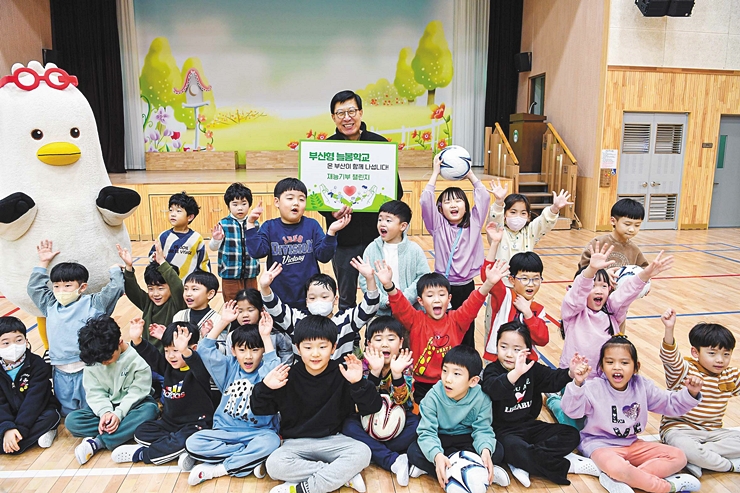News
Busan creates a 'village' to reverse low fertility rate

On March 13, Mayor Park visited a local elementary school and met children participating in new afterschool programs.
Korea's total fertility rate-the average number of children born to a woman during her reproductive years-fell to 0.72 last year, breaking its record for the lowest fertility rate in the world. The figure marks eight straight years of decline.
This demographic crisis is felt most keenly in Busan, where the fertility rate stands at 0.66, the second lowest among major metropolitan areas nationwide. The declining fertility rate goes hand-in-hand with a marked increase in the proportion of elderly citizens. The city passed the threshold of a "super-aged" society in 2021, when people aged 65 and older made up 21% of the population.
These factors, along with migration that sees young adults flock to Seoul in search of better jobs, mean the city's population is shrinking and aging at an alarming rate.
The trend does not appear to be abating soon. Births in Busan have declined by 50% in a decade. Last year, 12,900 babies were born in the city, a record-low figure since data tracking began in 1981.
City Hall is tackling the demographic problem head-on. Officials are working to enhance the quality of life for families.
To do this, Busan is ensuring parents have the means and support to raise children. Under the ethos of "it takes a village to raise a child," the city is promoting the "Aeji-jungji" campaign. Translated as "Caring for your child as you do," it reflects Busan's commitment to caring for children the moment they are born.
When introducing this new campaign, Mayor Park Heong-joon said, "I will raise our Busan children with the same care as I would my own children."
Under Aeji-jungji, City Hall and the Busan Office of Education have developed an "edu-care" system to expand and enhance public childcare and education. The city's daycare centers and kindergartens will open until 8 p.m. or later. The city will also operate 24-hour emergency childcare facilities. Elementary schools will extend their afterschool programs. In collaboration with local universities, these programs will develop students' physical, mental and emotional health and expose them to enriching educational opportunities.
Additionally, Busan will help pay childcare expenses. Parents will no longer bear the additional costs of special activities. Multichild families will also receive support through the Dongbaekjeon financial system.
Finally, Busan will revolutionize it's education infrastructure. From elementary school to university, students will have access to the skills required to advance key industries and compete in the global economy.
By providing better education, jobs, and childcare services, Busan expects to reverse the negative demographic trends plaguing the city.
Mayor Park summed up the need for action, "To tackle the decreased population, we need to recognize the underlying issues and find the practical countermeasures. We will make Busan a good place to have and raise children."
<Voca Spotlight>
fertility rate: 출산율
demographic: 인구통계, 인구통계학적인
keenly: 예리하게
proportion: 비율
threshold: 임계치, 임계값
flock to: ~에 몰려들다

